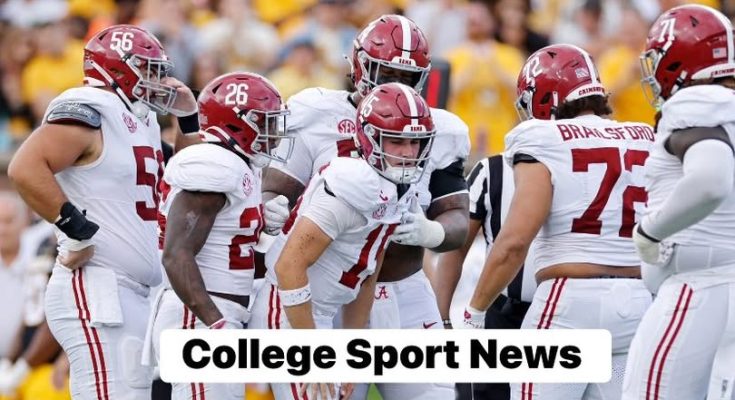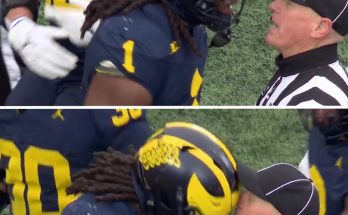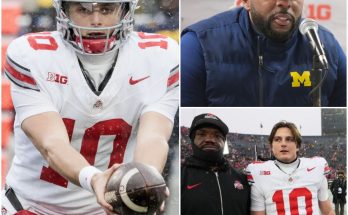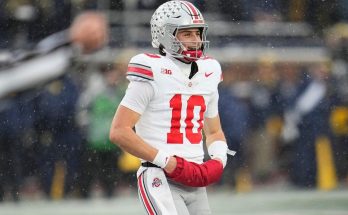Alabama football has long been known for its fierce intensity, both on and off the field, and the Crimson Tide’s latest display of leadership and accountability came from an unexpected source: quarterback Ty Simpson. Following Alabama’s hard-fought victory over Missouri, a win that was far from flawless, the team returned to the locker room Monday with the usual mix of elation and self-reflection. But instead of basking in their success, Simpson reportedly delivered a candid and hard-hitting assessment of his team’s performance, a move that an Alabama offensive lineman described bluntly: he “ripped our ass” during the team meeting. This moment underscores not only Simpson’s growing maturity as a leader but also the culture of accountability that Nick Saban has instilled at Alabama, where excellence is expected and anything less is met with immediate and unflinching scrutiny.
The context of the Missouri game provides essential insight into why Simpson felt compelled to speak up. Alabama’s matchup against the Tigers was challenging in ways that were not immediately evident from the scoreboard. While the Tide secured the win, the performance was uneven. Offensive drives stalled at critical moments, penalties disrupted momentum, and miscommunications led to missed opportunities. For a program accustomed to dominance, these lapses, though minor in isolation, accumulate into a glaring signal that the team needs to refocus. In such a scenario, leadership isn’t just about celebrating victory but about addressing shortcomings head-on, and Simpson’s willingness to do so highlights a maturity beyond his years.
Ty Simpson’s leadership style is particularly noteworthy because it contrasts with the traditional image of a quarterback at a program like Alabama. Historically, the Tide’s quarterbacks are highly skilled, highly recruited athletes who excel in the technical aspects of the game. They command attention with their playmaking ability, but true leadership extends beyond athletic prowess. It encompasses accountability, the ability to inspire teammates, and the courage to speak uncomfortable truths when the team’s performance falls short. Simpson’s postgame meeting remarks are a textbook example of this holistic leadership, demonstrating that he understands his role is as much about shaping the team culture as it is about executing plays on the field.
The offensive lineman’s description of Simpson “ripping our ass” is emblematic of the directness that defines Alabama football. Saban’s teams are built on a foundation of honesty and high expectations. Players are encouraged—and in many cases required—to confront difficult truths about their performance. This culture of accountability has produced decades of success at Alabama, and Simpson’s willingness to hold his teammates accountable reflects his assimilation into that culture. It also shows that he is not afraid to take responsibility for the team’s collective performance, even when the game resulted in a win. This distinction is crucial: true leaders recognize that victory does not absolve shortcomings and that improvement is always possible.
Simpson’s critique likely resonated deeply with his teammates because it came from someone who is not only a peer but also someone who shares their experiences on the field. As the team’s quarterback, Simpson is in a unique position to observe the game from multiple perspectives, including the execution of the offensive line, the timing of routes by receivers, and the strategic adjustments necessary to exploit opponents’ weaknesses. His observations carry weight precisely because he experiences the outcomes of every snap firsthand. When a player of his stature delivers candid feedback, it is more than just criticism; it is a call to action, a push for the entire unit to elevate their game.
The timing of Simpson’s remarks also reflects a strategic understanding of team psychology. Monday meetings, coming immediately after a game, are an opportune moment to address issues while they are fresh in everyone’s mind. By confronting the team directly and forcefully, Simpson ensured that his feedback could not be ignored or dismissed. It was a moment that demanded reflection, accountability, and a renewed commitment to excellence. This kind of leadership is rare in college football, especially among young quarterbacks still acclimating to the pressures and expectations of a program like Alabama. Simpson’s willingness to seize that moment speaks volumes about his confidence, character, and long-term vision for the team.
Simpson’s approach also aligns with the broader philosophy that Nick Saban instills in his players. Saban’s teams are not merely focused on winning games; they are focused on developing men who can lead, both on and off the field. Saban has long emphasized the importance of personal accountability, mental toughness, and the relentless pursuit of improvement. By stepping into a leadership role and addressing his teammates so directly, Simpson is embodying the values that Saban prioritizes. In doing so, he is positioning himself as a quarterback who can carry the mantle of leadership, not just in terms of play execution but in shaping the culture of the team.
The reaction from Simpson’s teammates further illustrates the impact of his leadership. Offensive linemen, in particular, operate in a high-pressure, collaborative environment where trust and communication are paramount. When a quarterback takes the time to critique their performance constructively, it signals that he values their role and expects excellence from every member of the unit. It is a reminder that success in football is not achieved individually but collectively, and that every player bears responsibility for the team’s performance. The offensive lineman’s acknowledgment of being “ripped” in the meeting suggests that Simpson’s message was received with seriousness, respect, and a willingness to improve.
Moreover, Simpson’s leadership extends beyond the immediate scope of the offensive unit. When a team’s quarterback steps forward to address issues candidly, it sets a precedent for accountability across the entire roster. It encourages players at every position to take ownership of their performance, to support one another in correcting mistakes, and to strive for consistent excellence. This kind of culture, where players hold themselves and each other accountable, is a hallmark of championship-caliber programs. Simpson’s actions reinforce that culture and provide a blueprint for how future leaders on the team can approach moments of adversity.
It is also worth noting the personal growth Simpson has demonstrated in this instance. Transitioning to a starting role at Alabama comes with immense pressure, both from the expectations of fans and the scrutiny of the media. For a young quarterback, the temptation to deflect blame or avoid confrontation can be strong, especially after a win. Simpson’s choice to address the team directly, without sugarcoating the truth, reflects a level of maturity and confidence that will serve him well throughout his career. Leadership in sports is as much about emotional intelligence as physical skill, and Simpson’s postgame meeting highlights his ability to balance honesty with respect, criticism with motivation.
The significance of this leadership moment extends beyond a single game or even a single season. In college football, the ability to foster a culture of accountability can have lasting effects on team performance. Players internalize the standards set by their leaders, and those standards become part of the program’s identity. By demonstrating that he is willing to hold his teammates accountable, Simpson is contributing to the long-term success and sustainability of Alabama football. He is reinforcing a culture where excellence is non-negotiable, where victory is celebrated but never used as an excuse for complacency, and where every player is motivated to push the boundaries of their potential.
Simpson’s approach also underscores a broader lesson for athletes and leaders in any field: effective leadership often requires courage. It is easier to accept a win quietly than to challenge your peers to do better, especially when the spotlight is on your team’s success. But true leaders recognize that growth and improvement come from confronting discomfort and demanding higher standards. Simpson’s willingness to speak candidly, to address areas of weakness, and to motivate his teammates through honest feedback demonstrates the kind of leadership that transcends statistics and game outcomes. It is about shaping character, fostering resilience, and cultivating a mindset of continuous improvement.
The offensive lineman’s candid acknowledgment of being “ripped” also speaks to the level of trust within the team. Leadership is most effective when it is rooted in respect, and Simpson’s teammates clearly respect his insight, perspective, and intentions. They understand that his critique is not about ego or dominance but about improving the team collectively. This mutual respect between quarterback and offensive line is critical in football, where cohesion, communication, and trust are essential for success. Simpson’s ability to deliver tough feedback while maintaining that trust is a testament to his interpersonal skills and his understanding of team dynamics.
Looking forward, Simpson’s leadership in the Missouri aftermath sets the stage for the remainder of Alabama’s season. The Crimson Tide, as always, face high expectations and formidable competition. Maintaining focus, discipline, and accountability will be key to navigating the challenges ahead. Simpson’s example provides a roadmap for how the team can approach each game, each practice, and each meeting: with honesty, with intensity, and with a commitment to continuous improvement. His actions signal to teammates, coaches, and fans alike that he is ready to shoulder the responsibilities of being the Tide’s quarterback, both on and off the field.
In many ways, moments like these define the trajectory of a young athlete’s career. Leadership is not measured solely by the victories one accumulates but by the influence one has on those around them, the standards one sets, and the culture one fosters. Ty Simpson’s decision to address his team so directly, following a victory that could have easily been celebrated without critique, demonstrates a profound understanding of what it means to lead at Alabama. It is a reminder that leadership is about more than talent or accolades—it is about accountability, courage, and the willingness to push oneself and others toward excellence, even when it is uncomfortable.
Ultimately, the story of Ty Simpson “ripping” his teammates in a Monday meeting after the Missouri game is more than a humorous anecdote; it is a powerful illustration of leadership in action. It captures the essence of what makes Alabama football a perennial powerhouse: a culture that demands accountability, fosters growth, and cultivates leaders who understand the responsibilities that come with their roles. For Simpson, this moment may well be remembered as an early defining instance of his leadership journey, one that showcases his maturity, his character, and his commitment to the team’s collective success. It is a testament to the fact that true leadership is earned through honesty, courage, and the relentless pursuit of excellence, both on the field and in the locker room.
As the season progresses, Ty Simpson’s actions will likely continue to influence the team in subtle but profound ways. His teammates have seen firsthand that leadership is not just about calling plays or throwing touchdowns; it is about holding each other accountable, pushing each other to be better, and maintaining a culture where excellence is the expectation, not the exception. Simpson’s willingness to confront issues head-on and his refusal to settle for mediocrity will inspire those around him to adopt the same mindset. In a program like Alabama, where every game is a test of preparation, skill, and mental toughness, that mindset can make all the difference.



